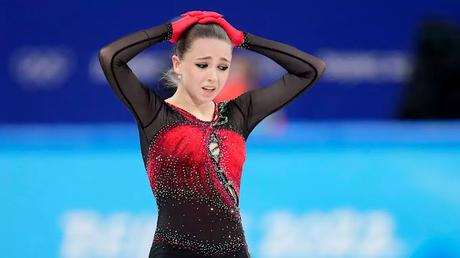
In December 2021, Russian Olympic Committee skater Kamila Valieva tested positive for a prohibited cardiac drug, the country's latest doping transgression. On Feb. 7, the ROC skating team won gold, with the United States taking silver, Japan bronze, and Canada finishing fourth.
Valieva, the 15-year-old skater who made history by landing the first quadruple jump at the Olympics, Russian skater will be able to participate but there will be no medal ceremony. She had a good chance of winning gold.
The International Olympic Committee has decided that a Russian skater who tested positive for a prohibited drug will be allowed to compete in Tuesday's women's singles event. Kamila Valieva, 15, failed a doping test weeks ago when she tested positive for the cardiac medicine trimetazidine, according to reports released late last week.
The International Olympic Committee stated in a statement issued Monday that the situation is "inconclusive," and that it would be "inappropriate" to host a medal ceremony for the figure skating team event, which Valieva's Russian Olympic Committee team won last week, at this time.
"Should Ms. Valieva place among the top three participants in the women's singles skating competition," the statement reads, "no flower ceremony and no medal ceremony will be held at the Olympic Winter Games." There will be "dignified award ceremonies" after her case is decided. Valieva is a favorite to win gold in the women's free skate after being the first woman to land a quadruple jump at the Olympics last week.
The decision is divisive. The United States Olympic and Paralympic Committee (USOPC) issued a statement shortly after the judgment was made, expressing their displeasure with the decision.
The USOPC is "disappointed by the messages this conveys," according to Sarah Hirshland, the committee's chief executive. "This looks to be another chapter in Russia's systemic and chronic disrespect for clean sport," she said.
"I can only support a clean Olympic Games that holds all of its participants to a higher standard of justice," former Olympian and current skating commentator Johnny Weir wrote on Twitter. This is a major setback for my sport."
But what exactly is trimetazidine, and how might it help an athlete perform better? Here's all you need to know about it.
What precisely is trimetazidine?
Trimetazidine, sometimes known as TMZ, is not licensed for usage in the United States. It is, nevertheless, used as a medicine in several European nations to treat angina, chest discomfort caused by restricted blood flow to the heart, and other cardiac problems.
According to the European Medicines Agency, trimetazidine is a "metabolic agent," which implies it is a drug that affects metabolism.
Jamie Alan, Ph.D., associate professor of pharmacology and toxicology at Michigan State University, states, "The mechanism of action is not well understood." The medicine, however, "enhances oxygen transport to the heart and presumably other tissues as well," according to Alan.
"It's similar to a medicine called ranolazine that we use in cardiology," explains Rigved Tadwalkar, M.D., a board-certified cardiologist at Providence Saint John's Health Center in Santa Monica, Calif. "Both can be utilized when a patient's other medications aren't well tolerated." Valieva and her trainers have not publicly said if Valieva has a cardiac ailment or why she took a prohibited drug medicine.
Trimetazidine is commonly used in the following ways.
Trimetazidine is intended to treat chest discomfort, but it may also be used to treat vertigo (dizziness) and ringing in the ears, according to Alan. It's normally started with three 20-milligram dosages three times a day, then gradually reduced to twice a day.
Trimetazidine has been linked to an increased risk of Parkinson's disease and other motor disorders such as tremors, muscular stiffness, walking difficulties, as well as restless legs syndrome. Many persons got these symptoms while using trimetazidine and then discontinued when the medicine was no longer effective.
How Trimetazidine can help athletes perform better
Since 2014, trimetazidine has been on the World Anti-Doping Agency's list of banned drugs. However, WADA said in a technical letter from 2018 that an athlete might test positive for trimetazidine after using lomerizine, a migraine medication approved by the World Anti-Doping Agency.
"If your heart gets more oxygen, theoretically, it can boost your overall performance," Alan says of why this substance is prohibited and may aid with sports performance.
However, it's unclear how much trimetazidine genuinely improves athletic performance. "It has been demonstrated in certain trials to lessen angina attacks and enhance exercise time in patients," Dr. Tadwalkar explains. But, he points out, this is in people who already have heart problems, not in those whose hearts are in good shape.
According to Dr. Tadwalkar, there is "a little bit of dispute" about how much trimetazidine can boost someone's athletic performance, but "there is evidence that this may be useful." "There is some notion that it might boost athletes' stamina, and there is obviously a concern that this may offer an unfair edge," he adds.
Valieva has kept her test results and impending competition a well-guarded secret. On Tuesday, she will participate in the women's free skate.

